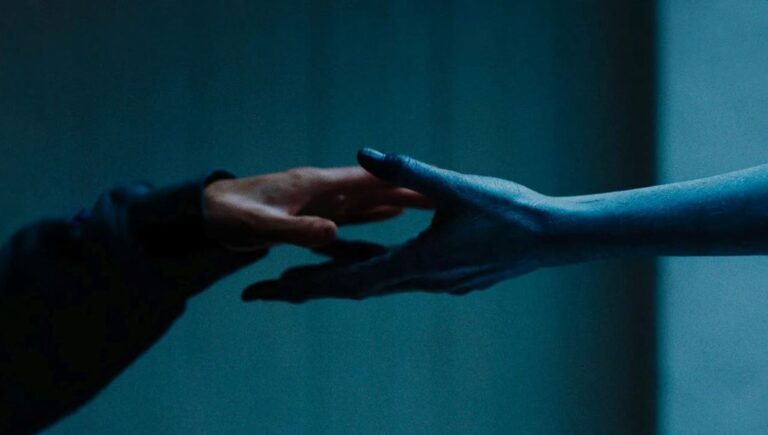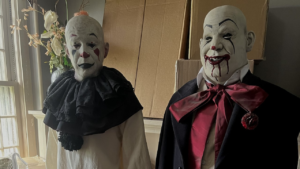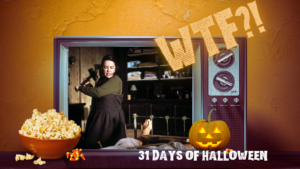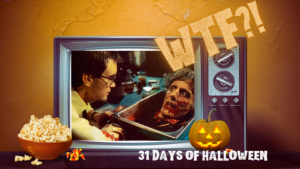Family follows a small tight-knit family unit during the summer of 2002. A homeschooled 11-year-old gets the idea that she can summon a good spirit to heal her dying father. However, something else comes through instead, bringing chaos and confusion as it causes a rift between her and her parents.
The genre is flooded with great examples of horror exploring mental illness, grieving families, and combinations of everything between those two categories. So, it has become difficult to find a film with something new to add to the conversation. Which is why writer/director Benjamin Finkel’s new film Family stands out. The movie tackles anticipatory grief through the eyes of a child. This is no small feat as this is a difficult concept to work through as an adult.
Is It A Family Affair?
Ruth Wilson (I Am the Pretty Thing That Lives in the House, Luther) is the strongest link in this film. People familiar with the actor’s work will not be surprised that she delivers another stellar performance in this film. Her portrayal of Naomi, a woman who is the sole caretaker for her ailing husband and also a mother at the end of her rope, is captivating. She manages to pull us into her character’s grief journey and her frustration with her daughter’s hallucinations.
She’s also tasked with not giving us clues as to whether Joanna (Lucinda Lee Dawson Gray) is right to be terrified of her parents or if this is simply a child’s mind processing an inevitable loss. I wish that Naomi could co-exist with Lizzy Caplan and Anthony Starr’s sketchy parent characters from last year’s Cobweb. She’s the most intriguing part of this movie. I look forward to the essays and articles that will be written about her in the next few years. Ben Chaplin (Lost Souls, Mrs. Davis) rounds out the small cast as the dad whose terminal illness is tearing his family apart.
Is Blood Thicker Than Water?
I like the family dynamic and how it is used to explore the mental well-being of a sheltered kid. Death is a hard pill to swallow at any age. Those with ailing loved ones dreading the inevitable phone call will relate to this film on a few heavy levels. The palpable anticipatory grief dripping from the film is practically Wilson’s main co-star. I appreciate how the topic was handled with care and respect.
Grieving people still with us is weird and adds another hellish layer to the mourning process. There is a full-time carousel of emotions that come with being in this situation. I dug that Joanna and Naomi were not the typical characters who get every part of this lonely dance right. They were allowed to be angry, selfish, and, most importantly, tired. We need more accurate depictions of people in this predicament because it’s messy, and there is no correct way to prepare to bury a loved one.
Come For The Vibes
Because this movie is a quick 95 minutes, it’s hard to be mad at it. It also continuously expanded on what the evil presence was capable of. This leaves you guessing what it might be until it reveals itself as the most obvious answer. If I hadn’t watched Family with my own eyes, I wouldn’t believe the side roads it took, nor where they led. Because this is a film in the post-Hereditary, The Babadook, The Night House, The Dark And The Wicked, and The Orphanage era, I was worried that it would feel like we’ve seen this movie before. While it’s not reinventing the wheel, it does expand on what we’ve been given in the trauma monster subgenre.
My biggest note (aside from a severe lack of diversity on screen) is that I wish it had gotten even messier. If only to compliment the beautiful job the script does at capturing one of the most difficult-to-explain experiences many of us may find ourselves in. I’m intrigued by the places this story went. I think the creepy voice and weird little creature were very nice touches, but I found myself wanting more.
It feels like the movie started to go off the rails in the correct ways, but then snapped back to a more restrained story. It could have gone so much bigger. At times you can almost see it leaning in those more compelling directions. Family sadly never commits to them long enough to make an impact beyond some cool imagery and a few dialogue starters. I’m not sure if that’s because it was aiming for a younger demographic or not. However, I hope Finkel aims even higher on his second feature.





